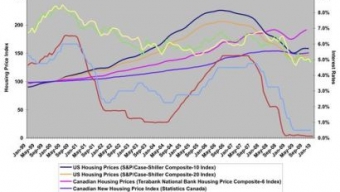By Behnam Rad
Spring is finally here and winter is reluctantly leaving us. Looking out, you can see lots of trees and greenery everywhere, runners and bikers, and hear the pleasant sound of birds chirping around you. These are not the only signs of spring however. If you pay close attention, you will notice the real estate signs around the city along with signs of renovations taking place, which all indicate another fresh start for the real estate market. The market is expected to become really hot by the end of May and early June as more sellers put their houses on the market, and as more buyers are shopping for new houses. To add to that, we also have the condominium high rises in Toronto which have made Toronto number one in the world in terms of number of condominiums available; way ahead of New York City and almost untouchable to the rest of the world.
Now the question that everyone has been seeking an answer for after the recession in the U.S. is resurfacing again. A question that nobody has a definite answer for; one that many choose to ignore, not care about, or simply choose to not even think about. No matter how hard people try to avoid this question however, they can’t avoid the fact that the answer is essential and truly necessary.
Canada’s housing market has been particularly resilient lately, especially after what happened to our neighbours just south of the border. Since the 2008 recession in the U.S., everybody is talking about possible housing bubbles in Canada. Most economists were sure that it would occur in 2010, but the market didn’t budge at all and continued to stay strong. With spring marking the start of the market frenzy, we are once again hearing about the possible housing bubbles in Canada.
Predicting whether housing bubbles will occur in Canada is possible if you know what parameters to look at, but it is important to remember that the prediction is not a mathematical formula with 100% accurate results. Although not perfect, predictions will nonetheless increase your knowledge about what is happening around you so that you can align your goals and decisions with the current trends in the market in order to prevent losses in the future. Now the next question is, what type of data will be necessary to help predict whether or not a housing bubble will occur in Canada?
Here are the questions that I asked myself:
۱٫ What are the parameters that drive the prices in the housing market to increase or decrease?
۲٫ Have there been housing bubbles in Canada before?
۳٫ If there have been housing bubbles in Canada before, what were the causes and signs? Are we seeing the same signs currently in the housing market?
۴٫ What will be the aftermath of a housing bubble in Canada?
۵٫ What can we do to protect ourselves from a housing bubble, in the case that it occurs, since we can’t prevent it from happening?
GDP (Gross Domestic Product) is one of the main parameters that affect real estate pricing in Canada. GDP is the value added to a product in an industry, minus the input which is required to make that product. For example, let’s say you are a famous chef and there is a line-up in front of your store to buy whatever it is that you cook. The amount of time and effort that you put into cooking the food counts as GDP, while the items that you purchase from the grocery store for cooking the food do not. Let’s look at a loaf of bread that you can buy from a bakery. The time and effort that the baker invests into turning the flour into bread, the time that a miller puts into making flour from wheat, and the time that a farmer spends on his land to grow the wheat are all aspects of GDP. The actual wheat and flour however, do not count at all towards the GDP.
By now, you might be wondering how GDP can affect housing prices in the real estate market. GDP has a direct relation to income. As a matter of fact, 50% of GDP income-base consists of salaries, wages, and labour incomes. The growth in GDP depicts higher income, which in turn shows that the economy has the power to purchase more goods. The increase in market power creates competition for purchasing better houses in better neighbourhoods, which leads to increases in property prices. Inflation, the rise of price in goods and services over a period of time, is another factor that affects the housing market. To put this into perspective, consider the following example: if you buy a sandwich for ten dollars today and inflation increases by 2%, a year from now you will no longer be able to buy the same sandwich for ten dollars. The same concept applies in purchasing a house, which shows how your money could lose its value every year. However inflation is not always bad. In Demand-Pull inflation, the increase in demand in the market due to the growing power of buyers causes the prices to increase thus resulting in more construction and growth in the economy.
Contrary to that, Cost-Push inflation, which is caused by a drop in market supply, can be extremely detrimental and destructive. Consider the following examples: let’s say that the price of meat increases because all the cows are dying of disease and meat needs to be imported, the price of lumber necessary to build houses increases due to a massive fire in the forests, and the price of oil increases because of some difficulties in the Middle East. In this situation, it is vital that you keep up with the increases in prices. The only way to go about this is to ask for a higher salary or to increase the fee on your services, which causes a Built-In inflation. A Built-In inflation is a never ending cycle of increase in wages and increase in prices which eventually leads to hangover inflation, which is extremely destructive to the economy. A sharp rise in inflation will actually lower housing prices because the economy is in fact losing its buying power since everybody is fighting to keep up with the rise in prices. This in turn causes a decrease in demand for new houses. As you can see, inflation can have both constructive and destructive effects, which is why everybody prefers to achieve negative inflation, if possible.
Aside from GDP and inflation, immigration is another important parameter that plays a crucial role in the housing market. Immigration is equal to demand; a demand which is present year after year. Thirty years ago, everybody was moving to either Toronto or Vancouver. In the past decade however, the rate of immigration has decreased in Toronto as Calgary, Edmonton, Montreal, and Ottawa have joined the list of popular destination areas in Canada. The immigration doesn’t affect the price of houses, but does play a huge role in the condominium market. Those who are new to the city prefer to reside in downtown Toronto, and a condo is always a better choice in comparison to houses in the downtown area.
The final parameter to consider is the mortgage rate in the housing market. A lower mortgage rate leads to an increase in the number of buyers thus leading to a hotter market and an increase in prices. The downfall of a very low mortgage rate is that home buyers aim far beyond their affordability powers for bigger houses in better neighbourhoods thus leading to problems when the mortgage rates begin to go up. Mortgage rates increase very fast once they begin to increase, which can lead to trouble if the rise is faster than the home-owner’s rise in income. If the home-owner is unable to meet this rise, they can meet great difficulties leading to foreclosure which in turn leads to decreases in demand and a decrease in prices in the housing market thus leading to an infinite number of subsequent problems.
As a side note, it is important to remember that when we talk about home buyers, we aren’t necessarily implying that the buyers will live in the house. The majority of buyers are investors and it is interesting to know that in the condo market, around 40% of owners are investors.
Stay tuned for the next article where we will talk about previous housing bubbles in Canada.
Behnam Rad, Real Estate Investor; Behnam.rad@sigmarealty.ca
مطالب مرتبط

عمو نوروز یا سنتاکلاز؟
آوریل 05, 2013
پرنیان نو و جامعه همدرد ایرانیان کانادا
سپتامبر 24, 2012
Snapshots of the Persian Pages
می 28, 2012
Snapshots of the Persian Pages
آوریل 11, 2012
؟۲۰۱۲, Where Should I Invest My Money Now
آوریل 11, 2012
تامی داگلاس
ژانویه 24, 2012
رهبری ویرانگر یک «دولت لایق»
ژانویه 24, 2012
تلاشهای خستگیناپذیر به نتیجه نشست
دسامبر 21, 2011



























































